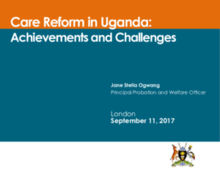Displaying 731 - 740 of 991
This presentation by key actors in children's care reform in Ghana provides an overview of the demographic data of Ghana and offers a thorough review of the situation of children's care, and care reform efforts, in the country.
This presentation by the Principal Probation and Welfare Officer of Uganda outlines the basic demographic data of Uganda and provides an overview of the situation of children's care, and care reform efforts, in the country.
This paper examines the extent to which socioeconomic vulnerability, psychosocial service consultations, and preventative social services spending impacts the reunification for children placed in out-of-home care.
This report explores federal programs available to support youth aging out of foster care in the US.
The article is based on a qualitative study of residential child care practitioners’ views and perspectives of the blocks and enablers to the implementation of staying put and continuing care practice with three Scottish local authorities.
This qualitative study investigates how a sample of male care-leavers from Girls and Boys Town South Africa transferred these social skills into independent living.
This paper reports the findings from a study investigating the priorities of care-leavers who arrived in England or Sweden as unaccompanied minors.
This article explores the perspectives and programme needs of transition service providers (institutions and the government) in preparing and supporting adolescent girls leaving institutional care in Harare, Zimbabwe.
This article explores the perspectives and programme needs of transition service providers (institutions and the government) in preparing and supporting adolescent girls leaving institutional care in Harare, Zimbabwe.
This book reviews changes in policy and practices that affected the generation of young people who grew up in state care in China in the last 20 years.




